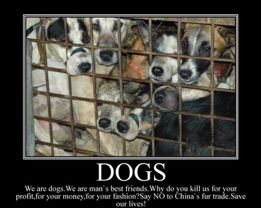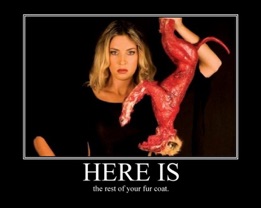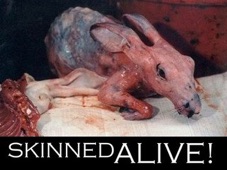FOLLOW





FUR



CHOOSE VEGAN is funded entirely by public donations. Animals depend on your generosity to continue vital work to expose and end animal abuse. Thank you for helping to free animals from cruelty.
SKINS AND FUR
Choose Vegan for animals
Other animals (let's not forget that we are also animals) are used as resources to provide materials for our clothing. Sheep and cows are bred and slaughtered; foxes, mink and rabbits caged and killed, wild animals shot or trapped, to make clothes and shoes from the skin and fur. All animals (human or not) need to protect themselves from the elements, but this doesn't provide justification for depriving another animal of his or her freedom and life, especially when there are so many animal-free alternatives available to us.
'Leather': depriving cows of their skin
While using the skin of various animals such as mink, fox, and chinchilla is no longer as common a practice as it once was due to the quantity of information available about the suffering caused by the fur industry, leather continues to be in high demand and extensive use, its main uses being in the manufacture of footwear, jackets, handbags, leather sofas, etc. Rarely do we question the fact that leather also comes from the skin of an animal, normally a cow (although it can also come from oxen, pigs, horses...), which has been tanned and treated to avoid decomposition and obtain the desired colour. If leather is not rejected like other animals' skins (mink, fox, etc) it's because it is usually thought to be a by-product of the flesh industry. In reality, leather is no by-product: cows are exploited for their milk, flesh and skin and paying for leather adds to the slaughterhouse value of the dead animal and supports this industry.

Pelts/Fur
During 'fur' production a significant number of animals, whether raised in cages or trapped in the wild, are skinned alive. Approximately 35 animals are killed and skinned to make a single coat and the 'fur' industry currently kills around 30 million animals a year. The use of fur is now widely rejected due to public awareness of the suffering and deaths it caused. However, we need to apply those same arguments for the rejection of any item of clothing made from animal skins, since every case involves someone else`s death. Curiously, the main argument used by those who defend such practices is that the animals raised for fur and leather production are equal to those raised for meat production, where conditions for the animals are the same or worse. For us this only demonstrates the need for rejection of all areas of animal exploitation.
Sheep’s hair wool is an animal product which is widely consumed and seldom questioned, in spite of the large amount of suffering involved in the raising and exploitation of sheep for wool production. Wool consists of a fine, long and elastic protein called keratin. Before we began exploiting sheep, they used to produce only enough wool to protect themselves from the cold, wild sheep do not need shearing. However, domestic sheep today have been selectively bred to produce more wool than is natural. This selective breeding has resulted in a multitude of illnesses related to their excessive amount of hair, such as overheating and flystrike and as well as the pain caused to them during shearing. Workers immobilise sheep during shearing in order to obtain every possible inch of wool from their bodies, ignoring the fear, pain and injuries they suffer as a result. Sheep are individuals with their own interests and desires, not producers of scarves, jumpers, gloves and coats.









ABOUT US
MEDIA
CONNECT
SUPPORT
Choose Vegan
the voice for animals
CONTACT






It is easy to buy products such as shoes, jackets, jumpers, hats and furniture made from synthetic materials or natural plant fibres such as cotton, hemp or linen - tell you friends and family.






